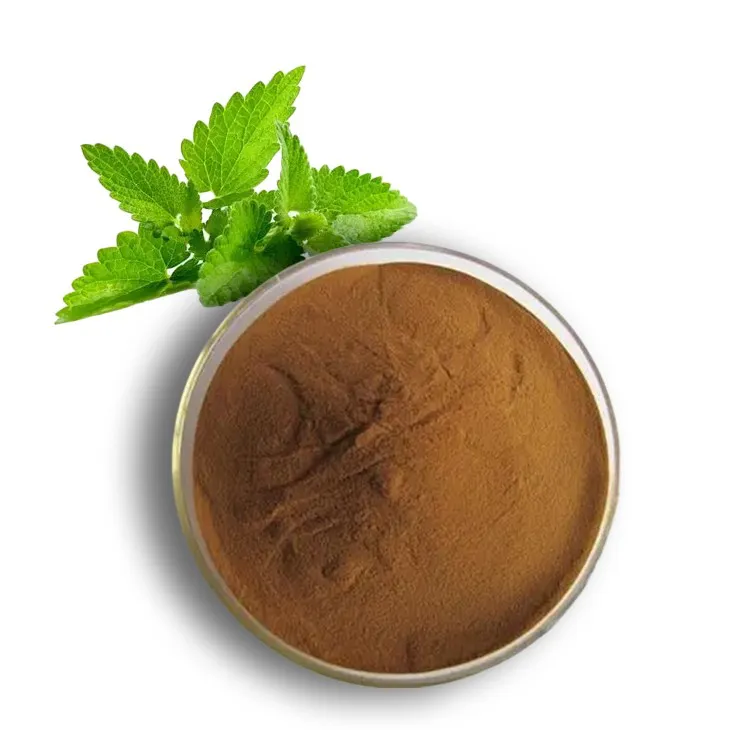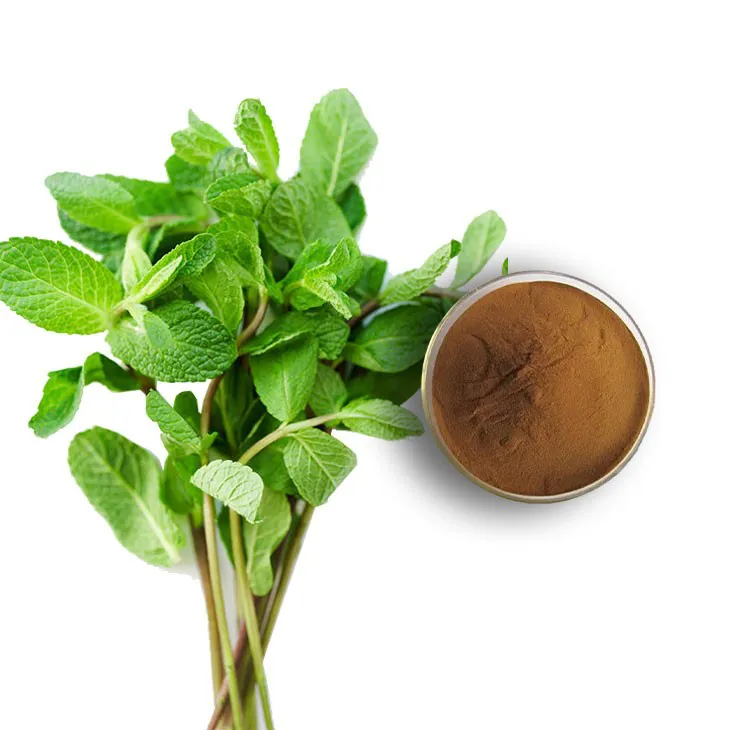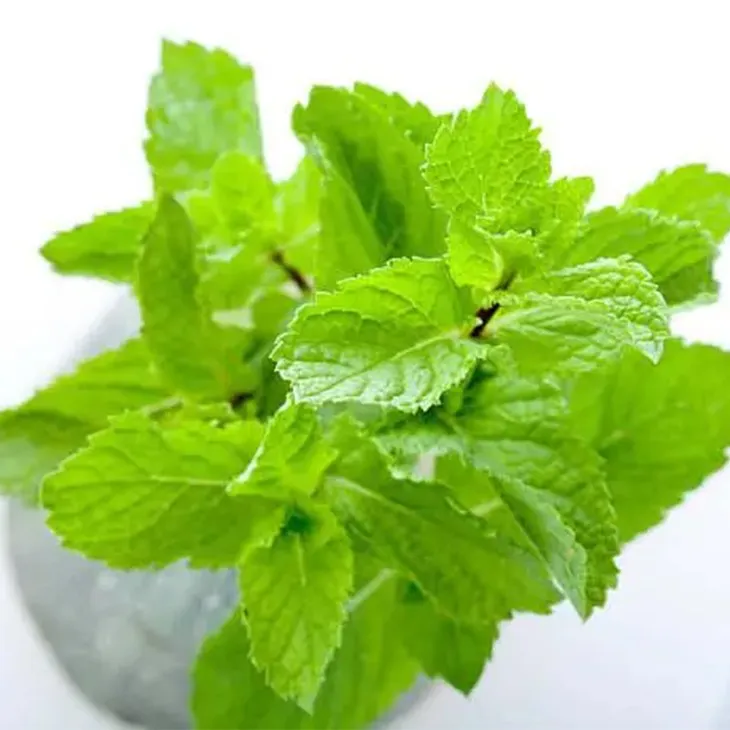- 0086-571-85302990
- sales@greenskybio.com
Understanding Private Labels of Peppermint Extract Powder: A Comprehensive Guide
2024-12-21

1. Introduction to Peppermint Extract Powder
Peppermint Extract Powder is a highly versatile and valuable product in various industries. Derived from the peppermint plant (Mentha × piperita), it contains a concentrated form of the plant's essential oils and other bioactive compounds.
The main components of Peppermint Extract Powder include menthol, menthone, and various esters. These components give peppermint its characteristic refreshing aroma and flavor. Menthol, in particular, is well - known for its cooling and soothing properties.

2. Composition of Peppermint Extract Powder
2.1 Active Compounds
As mentioned, menthol is a significant active compound in peppermint extract powder. It can provide a cooling sensation when applied topically or consumed. Menthol has the ability to interact with the body's thermoreceptors, giving the perception of coldness. Menthol also has antibacterial and antifungal properties, which contribute to its use in various personal care and pharmaceutical products.
Menthone is another important component. It has a characteristic minty smell and plays a role in the overall flavor profile of the extract powder. Additionally, esters present in peppermint extract powder, such as menthyl acetate, contribute to its pleasant aroma.
2.2 Carrier and Additives
In some commercial peppermint extract powder products, there may be carriers or additives. These are used to improve the stability, solubility, or handling of the extract powder. For example, some products may use a starch - based carrier to help evenly distribute the peppermint extract in a formulation. Additives may also be included to enhance the shelf - life of the product.

3. Uses of Peppermint Extract Powder in Different Sectors
3.1 Food and Beverage Industry
Peppermint extract powder is widely used in the food and beverage industry. In confectionery, it is a popular flavoring for candies, chocolates, and chewing gums. Its refreshing taste adds a unique dimension to these products. In the beverage sector, it can be used in teas, both hot and iced, as well as in some soft drinks. For example, mint - flavored herbal teas are a common and soothing beverage choice. Peppermint extract powder can also be used in baking, adding a pleasant minty flavor to cakes, cookies, and muffins.
3.2 Pharmaceutical and Healthcare
In the pharmaceutical and healthcare fields, peppermint extract powder has several applications. Due to its antibacterial and antifungal properties, it can be used in oral care products such as toothpaste and mouthwash. The cooling effect of menthol can provide relief from minor oral discomfort. Peppermint extract powder is also used in some over - the - counter medications for digestive issues. It can help relieve symptoms such as indigestion, bloating, and nausea. Additionally, in topical products like creams and ointments, it can be used to soothe skin irritations.
3.3 Cosmetics and Personal Care
The cosmetics and personal care industry also benefits from peppermint extract powder. In hair care products, it can be added to shampoos and conditioners. The refreshing scent of peppermint can leave the hair smelling clean and fresh. In skincare, it is used in products such as facial masks, lotions, and creams. Its antibacterial properties can help in treating acne - prone skin, and the cooling effect can be soothing on the skin, especially in products designed for after - sun care.

4. Significance of Private Labels for Peppermint Extract Powder
4.1 Brand Identity and Differentiation
A private label for peppermint extract powder allows a company to create its own brand identity. This is crucial in a competitive market where consumers are often looking for unique products. By having a distinct private label, a company can differentiate its peppermint extract powder from competitors' products. The label can convey the quality, origin, and special features of the product. For example, a private label might emphasize that the peppermint extract powder is sourced from organic peppermint plants, which can attract consumers who prefer organic products.
4.2 Quality Control and Assurance
With a private label, the company has more control over the quality of the peppermint extract powder. It can set its own quality standards and ensure that the product meets these standards at every stage of production. This includes controlling the sourcing of raw materials, the manufacturing process, and the packaging. Quality control is essential for maintaining the reputation of the brand and ensuring customer satisfaction. For instance, a company with a private label can conduct regular tests on the peppermint extract powder to check for the presence of contaminants and to ensure the correct concentration of active compounds.
4.3 Marketing and Consumer Appeal
Private labels can be designed to appeal directly to the target market. The label can use specific marketing messages and imagery to attract consumers. For example, a private label peppermint extract powder aimed at the health - conscious market might feature images of fresh peppermint plants and highlight the health benefits of the product. Marketing a private label also allows for more flexibility in pricing strategies. A company can position its product as a high - quality, affordable alternative to well - known brands, or as a luxury product with a higher price point depending on the target market.
5. Factors to Consider When Developing a Private Label for Peppermint Extract Powder
5.1 Product Specifications
The first factor to consider is the product specifications. This includes determining the concentration of active compounds such as menthol in the peppermint extract powder. Different applications may require different concentrations. For example, a product intended for use in strong - mint - flavored candies may need a higher concentration of menthol compared to a product for use in a mild - flavored tea. Additionally, the particle size of the powder may be important, especially if it is to be used in a formulation where easy mixing is required.
5.2 Packaging Design
Packaging design is another crucial aspect. The packaging should be both functional and aesthetically pleasing. It needs to protect the peppermint extract powder from environmental factors such as moisture, light, and air, which can affect its quality. At the same time, the packaging should be designed to attract consumers. For a private label, the packaging can be customized to reflect the brand's identity. This might include using specific colors, logos, and product descriptions on the packaging.
5.3 Regulatory Requirements
There are regulatory requirements that must be adhered to when developing a private label for peppermint extract powder. In the food and beverage industry, for example, there are regulations regarding the use of food additives and flavorings. In the pharmaceutical and healthcare sectors, there are strict regulations for products that make health claims. It is essential to ensure that the private label peppermint extract powder complies with all relevant laws and regulations in the target market.
6. Challenges in the Private Labeling of Peppermint Extract Powder
6.1 Competition
The market for peppermint extract powder is highly competitive, with many established brands and generic products. A new private label has to find ways to stand out in this crowded market. This may require significant investment in marketing and product development. For example, a new private label may need to conduct market research to identify unmet consumer needs and then develop a product that meets those needs better than the competition.
6.2 Cost Management
Cost management is also a challenge. While maintaining high quality, the company has to ensure that the production costs are kept in check to remain competitive in terms of price. This includes costs related to raw materials, manufacturing, packaging, and marketing. For instance, sourcing high - quality peppermint may be more expensive, but the company needs to find a balance between cost and quality to ensure profitability.
6.3 Maintaining Consistency
Maintaining consistency in the quality of the peppermint extract powder is crucial for a private label. Consumers expect the product to have the same flavor, aroma, and efficacy every time they purchase it. This requires strict quality control measures throughout the supply chain, from sourcing the raw materials to the final packaging. Any variation in quality can lead to a loss of customer trust and loyalty.
7. Conclusion
Peppermint extract powder is a valuable product with a wide range of uses in various industries. Understanding the significance of private labels for this product is essential for companies looking to enter or expand in this market. By carefully considering factors such as product specifications, packaging design, and regulatory requirements, and by addressing the challenges of competition, cost management, and consistency, companies can successfully develop and market their private label peppermint extract powder.
FAQ:
What is peppermint extract powder?
Peppermint extract powder is a concentrated form of peppermint flavor. It is made from peppermint leaves through a process of extraction and drying. It contains various compounds such as menthol, which gives it its characteristic minty smell and flavor.
What are the common uses of peppermint extract powder?
Peppermint extract powder has diverse uses. In the food industry, it is used to flavor candies, gums, baked goods, and beverages. In the pharmaceutical and cosmetic sectors, it can be used for its soothing and cooling properties. For example, it may be included in lip balms, creams, and some oral care products.
What makes the private label of peppermint extract powder significant?
The private label of peppermint extract powder is significant for several reasons. For manufacturers, it allows them to brand and market the product as their own, which can help in building brand loyalty. It also gives them more control over the quality, pricing, and marketing strategies. For consumers, a private label can often offer a more unique or specialized product compared to generic brands.
How is the quality of peppermint extract powder determined?
The quality of peppermint extract powder can be determined by several factors. The purity of the extract, the concentration of active compounds like menthol, and the absence of contaminants are important. It can also be judged by its flavor profile, which should be a true representation of peppermint. Additionally, factors such as the source of the peppermint leaves and the extraction process used can impact the quality.
Can peppermint extract powder be used in natural and organic products?
Yes, peppermint extract powder can be used in natural and organic products. However, it must meet the requirements for natural and organic certification. This means that the peppermint leaves should be sourced organically, and the extraction process should be free from synthetic chemicals and additives.
Related literature
- The Chemistry and Applications of Peppermint Extracts"
- "Private Labeling in the Food Ingredient Industry: A Case Study of Peppermint Extract Powder"
- "Quality Standards for Peppermint - based Products: A Review"
- ▶ Hesperidin
- ▶ Citrus Bioflavonoids
- ▶ Plant Extract
- ▶ lycopene
- ▶ Diosmin
- ▶ Grape seed extract
- ▶ Sea buckthorn Juice Powder
- ▶ Fruit Juice Powder
- ▶ Hops Extract
- ▶ Artichoke Extract
- ▶ Mushroom extract
- ▶ Astaxanthin
- ▶ Green Tea Extract
- ▶ Curcumin
- ▶ Horse Chestnut Extract
- ▶ Other Product
- ▶ Boswellia Serrata Extract
- ▶ Resveratrol
- ▶ Marigold Extract
- ▶ Grape Leaf Extract
- ▶ New Product
- ▶ Aminolevulinic acid
- ▶ Cranberry Extract
- ▶ Red Yeast Rice
- ▶ Red Wine Extract
-
Bamboo Leaf extract
2024-12-21
-
Phellodendron Extract
2024-12-21
-
Honeysuckle Pollen
2024-12-21
-
Mangosteen extract powder
2024-12-21
-
Sea buckthorn oil
2024-12-21
-
Apricot Powder
2024-12-21
-
Panax Ginseng Leaf Extract
2024-12-21
-
American Ginseng Root Extract
2024-12-21
-
Shikone Extract
2024-12-21
-
Lily extract
2024-12-21





















